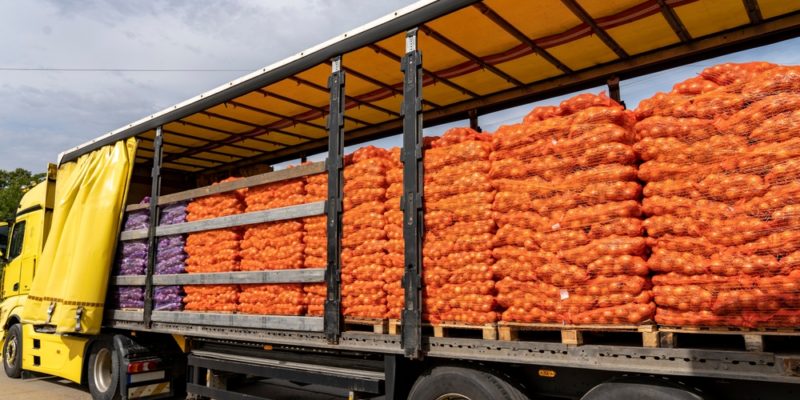How Supermarkets Can Reduce Food Spoilage in Transit
For supermarkets, maintaining the quality of perishable goods throughout the supply chain is critical. Food spoilage not only leads to financial losses but also negatively impacts customer satisfaction and sustainability efforts. A robust strategy for reducing food spoilage during transit is essential, particularly in Australia’s varied climate.
In this post, we’re sharing best practices that supermarkets can implement to minimise food spoilage and maximise the freshness of their products.
1. Invest in Temperature-Controlled Vehicles
The first line of defence against food spoilage is investing in reliable refrigerated transport. Supermarkets need to partner with logistics providers that specialise in temperature-controlled vehicles. These trucks are equipped with refrigeration units that maintain consistent temperatures, crucial for perishable goods like dairy, meat, and fresh produce. Advanced refrigerated trucks can adjust temperatures according to the specific requirements of different food categories, ensuring that products remain in optimal conditions throughout transit.
Temperature control is especially important in Australia, where temperatures can vary drastically across different regions and seasons. The trucks used should also be well-maintained to avoid breakdowns or refrigeration failures that could compromise product integrity.
2. Pre-Cooling Products Before Loading
Before any food product is loaded onto a vehicle, it should be pre-cooled to its ideal storage temperature. Pre-cooling ensures that food does not suffer from temperature shock when moved from storage to transport, helping preserve freshness. For fresh produce, this step is critical as it helps slow down respiration rates and reduces the risk of spoilage. This also prevents the refrigeration unit in the vehicle from overworking, ensuring the temperature remains stable throughout the journey.
Proper coordination between warehouses and logistics teams can facilitate smoother transitions between different stages of the supply chain. This can also prevent temperature inconsistencies that often result from poor planning or handling.
3. Real-Time Temperature Monitoring
Supermarkets can benefit from the implementation of real-time temperature monitoring systems during transit. These systems provide live updates on the conditions within refrigerated trucks, alerting drivers and logistics managers to any potential issues, such as rising temperatures or equipment malfunctions. Immediate responses to temperature changes can prevent spoilage before it occurs.
Advanced logistics providers may offer solutions that allow the continuous tracking of shipments, giving supermarkets insights into the temperature history of each delivery. Such transparency can help identify weak points in the transport process and make necessary adjustments to reduce waste.
4. Efficient Route Planning
Minimising the time food spends in transit is one of the most effective ways to reduce spoilage. By optimising delivery routes, logistics providers can ensure that products reach their destination quickly and efficiently. Factors like traffic, road conditions, and potential delays should be accounted for when planning the most direct routes. With Australia’s vast geography and regional differences in climate, optimising routes becomes even more critical, particularly when transporting perishable goods across long distances.
For regional or remote areas, advanced planning becomes even more important as these locations may have fewer delivery windows. Supermarkets should collaborate with logistics companies to develop bespoke route strategies that minimise transit times.
5. Training Drivers in Cold Chain Management
Drivers play a key role in maintaining the cold chain during transit. Providing specialised training ensures that drivers understand how to properly load, unload, and manage temperature-sensitive goods. They should be equipped with knowledge on how to monitor refrigeration units, identify potential issues, and respond quickly to any problems.
Proper handling of perishable goods during loading and unloading also makes a significant difference. By avoiding exposure to fluctuating temperatures, drivers can prevent premature spoilage. Regular communication between drivers, logistics teams, and supermarkets is vital to ensure smooth operations and minimise potential disruptions.
6. Use of Smart Packaging Solutions
Another effective way to reduce spoilage is by adopting smart packaging solutions. Technologies such as vacuum-sealed containers or modified atmosphere packaging (MAP) can significantly extend the shelf life of products. Smart packaging can regulate the internal atmosphere of packaging to slow down the natural decay process. Supermarkets that leverage these innovations can better preserve the quality of their perishable items throughout the journey from supplier to shelf.
In addition to reducing spoilage, these packaging solutions offer the added benefit of enhancing the supermarket’s sustainability profile. Less waste translates to a smaller carbon footprint and contributes to more environmentally responsible business practices.
7. Regular Maintenance of Refrigerated Vehicles
Regular vehicle maintenance is crucial to prevent mechanical failures that could lead to temperature inconsistencies. Refrigeration units should be routinely checked, and trucks should be inspected for insulation issues that might compromise temperature control. Proactive maintenance reduces the likelihood of breakdowns and ensures that vehicles are always in peak condition when transporting goods.
A well-maintained fleet not only guarantees the freshness of food but also reinforces the supermarket’s commitment to delivering high-quality products to its customers.
8. Choose a Reliable Transport Partner
One of the best ways supermarkets can ensure the freshness and safety of their goods during transport is to choose a reliable transport partner. At Cannon Logistics, we have over 18 years of experience in specialised refrigerated transport and warehousing. We provide transport and temperature controlled storage services to shipping providers, retail supermarkets, foodservice distributors, produce growers, cooperatives, and large and small manufacturers. We have a modern fleet of prime movers and trailers which are enhanced by the latest in temperature humidity control technology, meaning you can trust us to deliver your goods in optimum condition.
Final Thoughts
Reducing food spoilage in transit is a multifaceted challenge, but supermarkets can tackle this issue by adopting a combination of temperature control, smart logistics, and packaging solutions. By working with reliable logistics partners and staying ahead of potential challenges, supermarkets can ensure that their perishable goods arrive fresh and in prime condition, benefiting both their bottom line and their customers. Implementing these best practices not only reduces waste but also helps supermarkets operate more sustainably in the long term.

